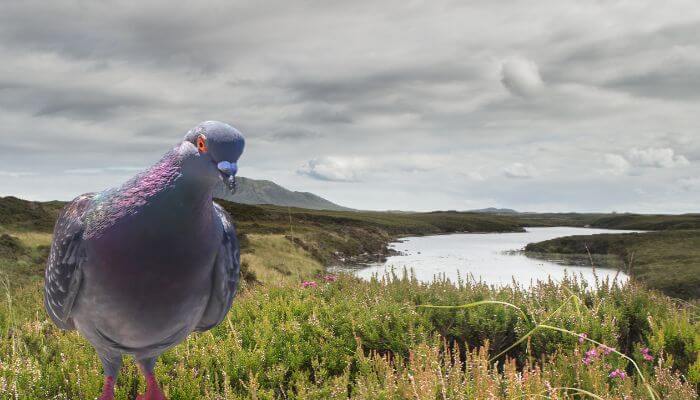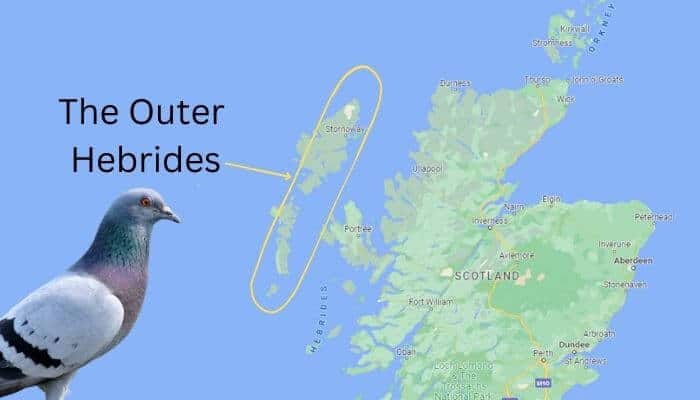Wild Rock Doves have been found in Scotland and the news has set the ornithological and genomic research community alight.
It has long been established that all members of the Columbidae family (doves and pigeons) descended from the wild rock dove.

Such information is usually centuries old so when new evidence corroborates such antique knowledge it is very newsworthy.
The Big News
In the grand scheme of things, pigeon fancying and the wider spectrum of the pigeon enthusiast community isn’t high on the list when it comes to exciting news.
That doesn’t put us off, however, as it means that when something does hit the headlines relating to the thing that we love, it feels even sweeter for it!
This is exactly what has happened with the discovery of something extremely interesting and perspective-shifting for all of us with an interest in all things pigeon.
In July 2022, a colony of wild rock doves, extremely endangered and rare birds, have been found on remote areas of secluded Scottish islands, and these birds are the wild ancestors of pretty much every species of domestic and feral pigeon in existence today.
There has been great excitement among the research community after small populations were recorded in the Outer Hebrides and the Orkney Islands.

Rock doves are thought to have been domesticated somewhere between 5000 and 10000 years ago primarily for the purposes of providing food. They were among the first, if not the actual first, domesticated birds in history.
Feral pigeons originated from instances of escaped domestic birds, and these are the kinds of pigeons that you can see every single day in towns and cities across the world.
Sadly, as the number of designated ‘feral’ pigeons increased, the number of pure wild rock doves declined as a result of extensive interbreeding.
What’s the Significance?
This discovery has sparked a new wave of research into pigeon species, with Oxford University student Will Smith commenting that “if you ask most bird watchers in the UK about rock doves they will say they’ve been hybridized almost out of existence by feral pigeons”.
The Rock Dove is the original form of the feral/domestic pigeon – among the world's commonest birds. But did you know that Rock Doves might go extinct 🧬?
— Will Smith (@WJSmith97) July 1, 2022
🚨Here is my (first!) paper @iScience_CP!🧵https://t.co/L2RnhHEyoE#Ornithology @_BTO @UniofOxford @Ben_Sheldon_EGI pic.twitter.com/8MTX8jHjka
The research team at Oxford began a project to analyze DNA to determine if the colony was made up of ‘wild’ birds and the results delivered what everybody had been hoping for!
The study proved that the rock doves in the Outer Hebrides were indeed descended from the undomesticated lineage from which all wild pigeons originate and added further evidence to the theory of “extinction by hybridization”.
The team established that the rock doves found in Orkney had experienced extensive interbreeding with feral pigeons. This was not the case with the rock doves in the Outer Hebrides where there were negligible signs of hybridization.
There were varying levels of hybridisation. In Orkney, all birds had lots of domestic genetics 🧬. Those in the Outer Hebrides👇 had less! 🕊💫 ‘Feral’ genetic material was distributed throughout the genomes, and included genes that impact morphology. https://t.co/L2RnhHEyoE pic.twitter.com/RoAQActw5v
— Will Smith (@WJSmith97) July 1, 2022
Smith went on to exclaim “this is the first genomic study that proves there are undomesticated rock doves that are relatively isolated from feral pigeons…it was quite a surprise. It is exciting.
It is also kind of weird that it’s in the UK because there are so many feral pigeons here. I guess places like the Outer Hebrides are far enough away from towns and cities that there’s less gene flow.”
To an untrained eye, rock doves look extremely similar to feral pigeons, with the only big difference being that whereas a flock of pigeons might feature a number of different colors, wild rock doves will have identical plumage.
You can think of this in terms of wolves and dogs, in the sense that all wolves look the same color-wise, while there are hundreds of species and breeds of dogs that vary in shape, size and coat length and color.
The Scottish rock doves live among the sea caves and ruins and they were observed flying from their nests to feed in nearby flower meadows.
The Oxford team hopes their findings encourage other discoveries of wild rock dove populations around the world and on a wider brief, hope that an increased understanding of extinction by hybridization will help conservation efforts for other flora and fauna facing the same fate as the rock dove.
We think you will agree as a member of the bird-loving community that uncovering the existence of a true origin of the species isn’t something that happens every day.
We can feel lucky that it has happened to members of the animal kingdom for which we have a soft spot!
